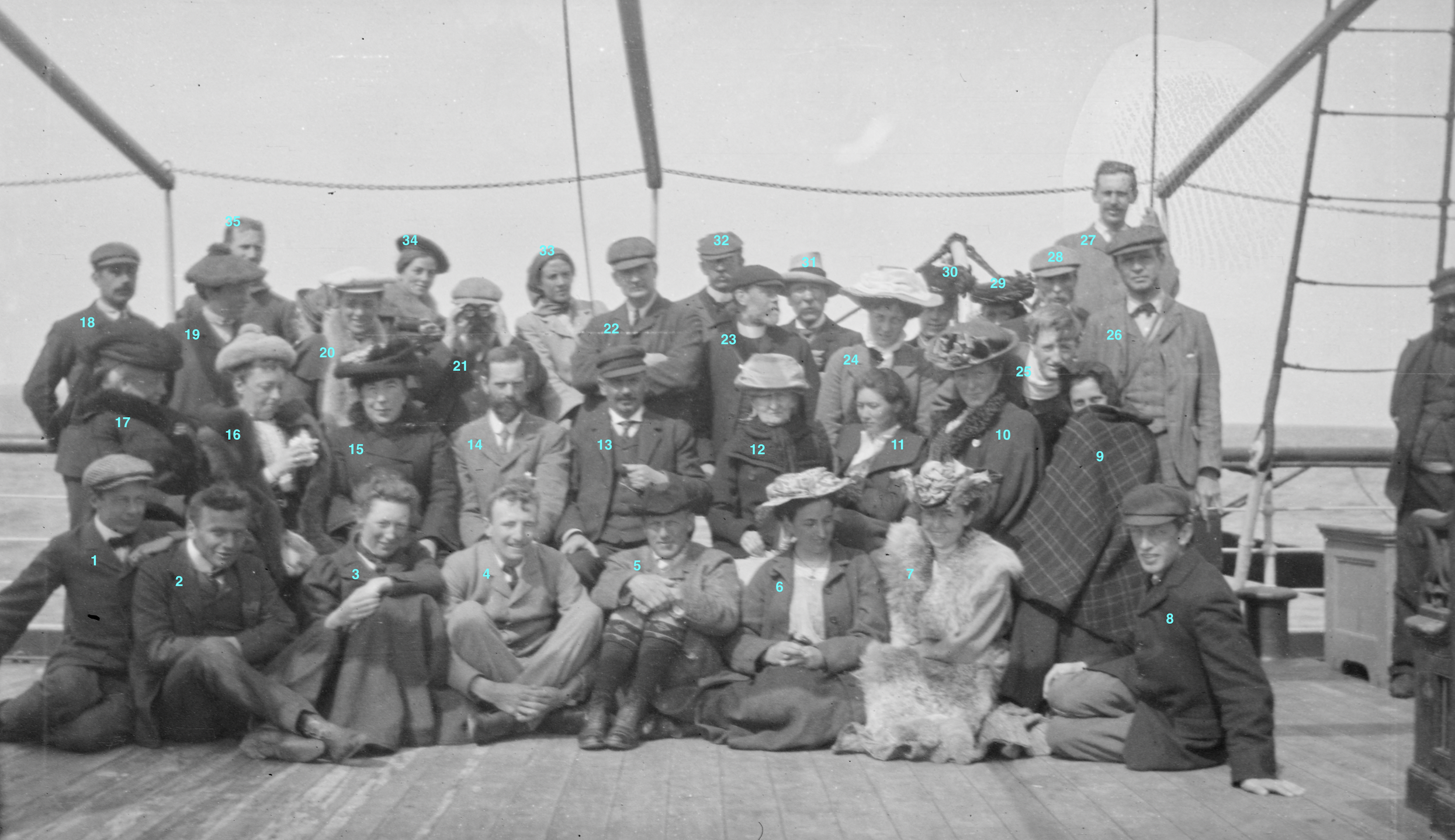Cellulose nitrate, also known as gun-cotton, was used as a detonation agent in mining, a propellant for firearms and a critical ingredient in early photographic emulsion. The Wace Archive’s nitrate negatives, dating to the Edwardian era, degraded over decades to become a highly combustible potential bomb situated amidst a sea of archival paper. We digitised swiftly, not expecting much image to remain on the heavily corroded collodion surface. We received a startling surprise.
Alan J. B. Wace (1879-1957), later Laurence Professor of Classical Archaeology, graduated from Cambridge in the summer of 1902 and immediately departed for the eastern Mediterranean, camera in hand. As a student at the British Schools at Rome (BSR) and at Athens (BSA) in 1903, he crafted employment in places where he could explore the landscapes of Graeco-Roman antiquity. One such ingenious solution to impecunious post-graduation existence was to volunteer as Professor Ernest Gardner’s Secretary on educational cruises in the Aegean during Easter 1903 (SS Pelops) and 1904 (SS Peneios).
The Classics Archives hold Wace’s original photographic prints from these excursions. The vast majority functioned as his archaeological aide-mémoire; human figures in the background are largely incidental. Yet, we know from the accompanying Photo-Exchange lists, whereby members of the cruise would pool photos, that portrait snaps of people were also taken. When Wace’s ‘explosive’ negatives were digitally remastered in 2022 an entire suite of images emerged for the first time in over a century, including many missing images of individuals and groups. Now, the task remains to identify participants.
The Party, SS Peneios, 1904. AJBW-3-56-33
It is clear from the group image above that an almost equal number of men and women took part. (Wace is No. 8 in the photo.) The tenor of these tours favoured brisk pedagogy, evidenced from the full itinerary of ancient sites visited. The ship departed Piraeus for the Cyclades, Crete, Rhodes, coastal Asia Minor including Ephesus and Troy, then circled back to Delos, Corinth and ended with an overland trip to Delphi. The SS Peneios sortie continued to the Peloponnese (Olympia) and in particular the Argolid (Epidaurus, Mycenae and Tiryns). Tours were arranged and led by Gardner (1862-1939), formerly a Director of the BSA and then Yates professor in classical archaeology at University College London (UCL). Gardner (No. 14) described in his guide to Greece and the Aegean, “Greek coastal steamers are a very convenient means of transport…They call at nearly all the important ports on the mainland and the islands, and usually provide good food and tolerable sleeping accommodation” (Rev. ed. 1938, p. 40).
On the SS Peneios in 1904 were the sisters Catherine and Mabel Gaskell, and their father, Trinity Hall Fellow and cardiologist Walter H. Gaskell, who all attended Gardner’s UCL Archaeology course in 1903-1904. Catherine (1879-1961) read Classics at Newnham, matriculating in 1900, one year after Jane Harrison - already of quasi-mythical status - was appointed as Lecturer in Classical Archaeology at Newnham College. Catherine went on, in addition to playing hockey at an international level, to publish articles in the Dictionary of Archaeology (1906-1914) and the Encyclopaedia of Religion and Ethics (1908). The knowledge and networks gained through such tours enabled this generation of university-educated women to seek further academic self-expression, even if it was yet rarely in a paid professional context.
Also enrolled on the UCL 1903-1904 course and on board SS Peneios with the Gaskells were Lady Louisa Magenis, philanthropist (1837-1918), Adeline E. Montagu (1876-1952), Dorothea F. Conybeare (1880-1973), and her maternal cousins Mary F. (1881-1975) and Eleanor M. Cropper (1878-1933, who became Lady Acland by marriage).* Other voyagers included Louisa Pesel (1870-1947), appointed Director of the Royal Hellenic School of Needlework and Lace in 1903, and Gardner’s wife Mary, author of a Modern Greek grammar (1892). Many of these women were linked through an active commitment to women’s suffrage, in addition to archaeology. Several also published novels, with contemporary success but not long-standing fame.
Miss Catherine Gaskell
Miss Eleanor Cropper in foreground and unidentified woman
On board SS Pelops the previous year in 1903 was the author E.M. Forster (1879-1970), who read History and Classics at King’s College, Cambridge. On that trip the Photo Exchange list describes one image as, “Melos. Landing place with Miss S. Welsh and poppies” and another, “Melos. Ploughing scene and poppy field”. One wonders if any of the English upper-middle class female tourists around him served as inspiration for characters in Forster’s 1908 novel A Room with a View, either as models for Lucy or Miss Lavish.
On Gardner’s 1902-3 UCL Archaeology course and present on SS Pelops were Selina Spalding, Leila Spaulding, Jessie Potter, Katherine Cochran, Margery Corbett, Miss G. S. Kimball, Minna Talcott, Emily A. Clayden, Margery K. and Sybil I. Welsh, Henrietta Failing, Miss Kahnweiler, Mary A. Shute, Emily Norcross, Helen Glover, Evelyn Anstruther, Julia Caverno and Miss A. G. Harkness.*
These women do not have a significant presence in public archives to date, unlike most of their male contemporaries sailing with them. If you can add any further details – are you descended from one of these women, do you or your wider family hold letters or diaries written by them that we might consult? - then please contact archives@classics.cam.ac.uk. Meanwhile, do enjoy browsing the fascinating digital photo albums held in the Explosive Wace collection.
Dr Rebecca Naylor
*My thanks to Dr Amara Thornton for providing this data garnered from UCL’s Special Collections.




